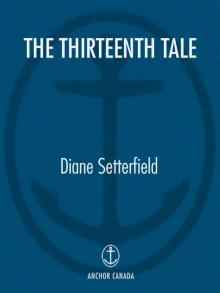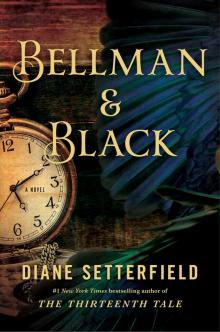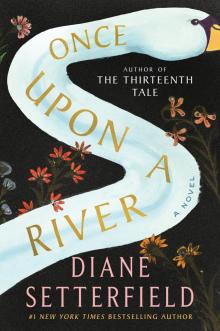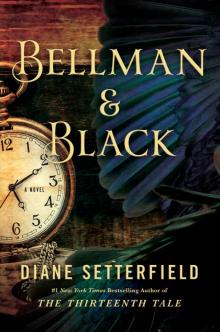- Home
- Diane Setterfield
Bellman & Black Page 7
Bellman & Black Read online
Page 7
Will muttered a suggestion to the owner of the cow, and the man nodded.
“Boys,” he said. “Run up to my wife at the farm. Tell her what I want, and she’ll give you the tools. I need the cellar door off its hinges and brought up here, quick as you can.”
A job! A door to be taken off its hinges! Off they went.
In the third hour they got the fence posts under the cow and a sturdy door made its way horizontally over the field on a dozen legs. Six men raised the cow, two per post. It was out of the question to bring her up into her home field: the bank would only collapse under them. So they raised her to the wrong side and laid the door across the ditch like a bridge, and the cow—“See my lovely? Didn’t I tell you so?”—when she had found her legs, needed little encouragement to cross it and return to her own field.
She looked about her with a surprised air, then put her nose to the grass and began to eat.
“She looks right as rain, to me,” Will’s uncle said.
The men blew out their cheeks and arched their backs.
“Will, this is Thom Weston. Thom, my nephew Will.”
“Pleased to meet you.”
Hands were too wet and dirty to want shaking, and after what had passed, it was superfluous anyway.
“You’ll come up home?” Thom Weston raised a closed hand and tilted it toward his mouth. An invitation.
· · ·
At Thom Weston’s farm a woman ran out to meet them. Nice blue eyes with friendly creases round them, and not a bit of gray in her fair hair. A good-looking woman, only worried. “Is she up?”
Yes, yes, she was up and out, she would go on all right now. No harm done, only a lot of time lost and six thirsty men. Oh, and this is William Bellman, Geoffrey’s nephew, over from Whittingford.
She smiled in relief and then at Will and her teeth were set straight but with gaps. It made you like her all the more.
“Rose!” she called into the house. “Set the table. Bread and butter and get out the cured ham. And peel cake!”
In the kitchen the men stripped off their shirts to rub themselves dry and unlaced their sodden boots. Thom’s wife stoked the fire, and Thom was as good as his word and poured something warming generously into glasses.
“You are not riding back to Whittingford tonight, are you, Mr. Bellman?” Thom’s wife asked, looking at the wet garments that were draped all around the hearth. When she learned that he was, she called again. “Rose! There is a young man here soaked from head to foot, who has to ride to Whittingford this evening. Before all the rest, take his boots. Let’s see if we can’t get them a bit dry before he goes.”
The chinking of plates and cutlery from the next room stopped and a girl appeared and leaned against the doorframe. Fair hair, blue eyes, the spit of her mother.
“Shall we try something of grandfather’s on him, Rose? Would it fit?”
The girl’s eyes measured him up. “I think so.” She looked him in the eye. Her gaze was straight and steady. “You’ll not have to mind the smell of mothballs.”
“I don’t mind.”
She turned to fetch the clothes.
“I’ll bring them back next Sunday,” he told Mrs. Weston.
From the next room, the girl looked over her shoulder at him and smiled. She had a nice gap between her teeth too.
· · ·
Paul had told him yesterday everything he needed to know about the East India and General Company order for fine cloth, and today it was plain that not a word had gone in. Paul went over it a second time.
“Right,” William said. “I understand it now,” and he settled down to the record book again.
“Anything wrong?” asked Paul.
“No.”
But William was off-kilter, Paul could tell. Something had unsettled him. Perhaps it was time to take him fishing again. In the peace of a Sunday afternoon perhaps his nephew would be coaxed into revealing what the trouble was. But when he proposed an afternoon on the river, Will looked alarmed. He couldn’t go, he had something he had to do.
Well. He’d tried. Whatever it was, it would probably blow over. Anyway, even with only half his mind on the mill, William still did a fine job.
· · ·
William’s calfskin notebook went unopened for a week. There were no spare minutes in the day to be filled with tasks, because every minute was filled with Rose. Her eyes, her hair, her teeth—he could spend half an hour imagining running his tongue over those teeth. And then, the rest of her was exactly as he liked. She was well made, whether you looked at her from the front or behind or sideways on. After that first frank look, she had not lifted her eyes to his until they said good-bye. It was not coyness: She was too occupied to be coy, what with packing his boots with old rice to draw the wet out, slicing bread and ham, pouring tea and fetching cake, making wide-eyed faces at her baby sister, wagging a finger at the brothers who were out to steal each other’s cake. But he knew by the way she didn’t look at him that she was pleased he was looking at her.
As it turned out, the gap between Rose’s teeth was every bit as pleasant to his tongue as he had imagined.
“Every time you smile, I see that gap and I have to kiss you,” he told her.
“That’ll be a lot of kissing then,” she replied, “because I smile all the time!” And it was true. She was smiling as she said it. He kissed her again.
How many Sundays had it been now? Three, including that first. Only a fortnight then, and a whole new world.
In a field, under a tree, they kissed and clung and petted. His fingers had found the way into her undergarments already, and hers into his. They were delighted with the thrills hands could give and receive but yearned for more advanced pleasures.
“I want—” he said and, “So do I,” said she.
The trouble was, having got her parents’ cow out of a ditch he was indebted. That good woman, kindhearted and so quick to think of his boots. Making her cross? It was unthinkable. He thought of the tender man who had spoken so soothingly to his terrified cow. No. It was a happy home, and William would not bring grief into it.
But, but, but. They couldn’t go on as they were. Bliss, disaster, call it what you will, the thing was bound to happen sooner or later, they wouldn’t be able to stop themselves. It was a predicament.
On Thursday, in the tenterfield, the solution came to him.
“Uncle Paul!”
Paul half rose in alarm as William burst in. “What is it?” He prepared himself for news of an accident: someone burned or drowned, cloth scorched or torn or blown away.
“I must have the horse. I have to ride to Nether Wychwood.”
“Now? Why?”
“There’s a girl. I have to marry her.”
“This minute? Surely not. Sit down.”
William didn’t sit down. He didn’t even remove his hand from the door handle but stood ready to be out the door the minute he had permission. But he did answer Paul’s questions. Who are her people? And this Rose, what does she do all day? Why is it this girl that you must marry?
They rode to Nether Wychwood together. Paul saw that the Westons were good people. The Westons liked what they saw of Paul. Will and Rose sat palely on the settle, hand in anxious hand. The date was set for a fortnight’s time.
CHAPTER FOURTEEN
The hopes of the Misses Young, which had never matured into expectations, now died. Poll ruffled William’s hair like a pet dog when Ned took him for a last bachelors’ drink in the Red Lion. “Nice girl, is she?” and on learning the answer, “that’s all right then.” The spinsters teased relentlessly until they made William blush, for once he was wed, they would never be able to tease him again. And everywhere he went in the mill, men shook his hand and offered congratulations or jovial warnings. Mute Greg presented him with a pair of figures, a bride and groom, that he had twisted himself out of straw.
William met Fred and Jeannie arm in arm in the high street, she buxom as a hen, he grown fat on bread and cont
entment: “Good news, William. It’s a sweet life!”
“And this is from Charles,” Paul said. It was a letter congratulating him and letting him know that he was sending a gift for William and his new wife: a painting of Venice, to put on their wall.
And now, walking home after midnight, the night before his wedding day, he failed to see a form hunched low against a wall in the dark. The first he knew of it was when his foot caught and he went flying, hands out to save himself from a fall. The thing he had tripped over sprawled and grunted and something sounded: glass, a bottle tipping over.
“Luke? Is that you, Luke?”
“Who’s that?”
“It’s Will Bellman.”
The figure in the dark groped for something, there was a tiny chinking noise and a murmur of satisfaction. The bottle was not broken, then. The smell of drink was strong off him, and William was not certain that Luke knew who he was, nor whether he knew someone was there at all. He put a hand on Luke’s shoulder—he was even thinner than he had been as a child, if that were possible—and shook gently.
“Luke? You all right? What are you up to, these days?”
There was a long silence, long enough for Will to think the drink had put him to sleep, before Luke came to himself and spoke.
“I remember . . .” Words failing him, Luke resorted to an impoverished pantomime with his shaking hands. Spitting in his palm—well, that was what it looked like—and fingertip meeting thumb with drunken delicacy, and a gesture, fine, stroking, meaningless. Luke expelled a few more syllables—catapult, it sounded like that, anyway—and chuckled in pleasure.
William waited, but there was no explanation.
“I’m getting married tomorrow,” he said.
There was no sign that Luke had heard him. After another silence, William made up his mind to go, but Luke’s voice came again: “Do you remember? I remember . . .”
William turned. He walked home for his last night alone in his bed.
I am getting married tomorrow, he told the house as he entered it. I am getting married tomorrow, he told the candle, snuffing it out. He laid down his head and whispered “I am getting married tomorrow” to the pillow. And then, in the moment before he fell asleep, the thought came to him of a drunken night in the Red Lion: I’ve covered her up, nice and cozy.
But it didn’t keep him awake. He was getting married tomorrow.
CHAPTER FIFTEEN
William Bellman no longer drank at the Red Lion. He played no more games of cards behind the fulling stocks. He had paid his debts, settled his slate. That part of life was over. At the age of twenty-six, the young man had a regular income, health, and the liking and respect of his fellow men. After five years of marriage, he had discovered more reasons to be in love with his wife than he knew on the day he had married her, and when they argued they did it rapidly, effectively, and made it up with good hearts. His daughter Dora was a healthy child, curious and quick to learn, and his baby boy, who in good Bellman tradition they had just named Paul, laughed at everything and grew strong.
Life was good to William Bellman. Even those who did not know him but only saw him in the street could not help but be struck by the impression he gave of himself: here is a man who is healthy, happy, and successful said his gait, and even his clothes, from his hat to his boots, seemed to have a word to add about the positive qualities of their bearer.
William was not unaware of his good fortune, but being more given to action than contemplation, he enjoyed his happiness rather more than he thought about it.
Others were not so lucky.
There came a hammering at the cottage door early one winter’s morning. William opened the door and snow blew in. It was Mute Greg, snow on his shoulders, shivering and with urgency in his eyes.
Was it a fire? Had there been a break-in? Were the machines wrecked? It could not be unrest among the workers: he’d have known. Other millers then, jealousy . . .
William piled his clothes on over his nightshirt and ran with Mute Greg back to the mill. When he was heading toward the buildings, Greg took his arm and tugged. Not that way. He drew a circle with his hand in the cold air: the wheel.
There was no separation between the sky and the land. There was only snow. The only things not white were the oaks. In the upper branches were black clots of twigs, last year’s rooks’ nests. A few mill hands awaited them. These were the men with no homes, who slept in the mill, huddled around the stove that heated the warming plates for the first part of the night. If it was bitter cold they moved then to the seg barrels, put up with the foulness of the stink for the fermenting heat.
William stood by them, and they considered the wheel. Something was impeding its movement. A branch, most likely. Perhaps the weight of snow had made it fall. Or else someone’s timber stack had toppled and a log had rolled into the water, been carried down river, jammed the wheel. Or some desperate soul had stolen a barrel of beer and after drinking the contents had dumped the barrel in the river for fear of discovery.
Will took off his coat and jacket. Hesitation could only make it worse. He lowered himself in a single shocking moment into the water, and only frowned at its bitter sting. Quickly, before the cold could stun him absolutely, he waded to the wheel and peered at the dark shape through the splash and spume, trying to get a sense of its length and its lay. He must get a firm grasp on it in the first moment, before his hands were too cold to know what they were doing. He plunged his arms in to the shoulder, took hold, and heaved.
The first effort achieved a minuscule shifting. At the second the obstacle came free. A hand flailed out of the water and gave William a thump on the mouth. For a second William thought it was his own fist, benumbed by the cold. He dragged the waterlogged cadaver to the edge; the men grasped the drowned man by his clothing while Greg reached out a hand to Bellman. They came out of the water together, the dead man and the living, icy water streaming off both their bodies.
“What’s going on?” It was Paul, come running, alerted by a messenger. “Good Lord! Who is it? Anyone know?” And then, more urgently, “Get William home, quick, before he freezes to death. Get him dry. Get him warm.”
William felt a fire inside him. He could not carry his own weight, needed a man on each side of him, his arms across their shoulders, and supported like that he could just manage to put one foot in front of the other.
Behind him, they rolled the body over.
“One of the Smith boys,” somebody said. “Better send to the forge and tell his brothers.”
“They won’t want to know. He never had much to do with them. Nor anybody.”
“He’ll have been dead drunk and fallen in. That’s what it is.”
Paul spoke. “He dug the graves, didn’t he? Poor fellow.”
William turned to look over his shoulder.
On the snow, a flare of brightness. Copper hair, washed clean by the Windrush.
An urgent rook in the treetops cawed a stony message that only the dead man heard.
· · ·
Rose stripped William, rubbed him dry, and draped blankets over him. She stoked up the fire. She boiled water and he drank honey water fortified with liquor. She heated more water for the tub, and he sat waist deep in it while she poured bucket after bucket of hot water over his shoulders. She dried him again, dressed him in more layers of clothing than he knew he had. She dragged the armchair close to the fire and sat him in it.
First he was hot, then he was very, very cold.
The baby slept, but Dora, made curious by the unusual activity, got in the way. Rose scolded her, sent her away. He heard his daughter weeping.
“Let her come,” he said.
The child climbed onto his lap, and his painful fingers managed to wrap his blanket around her. Enchanted by the novelty of the snow and having her father at home by day, Dora rested quietly against him. He felt her breathing grow steady and regular. The solid weight of her against his thighs and belly. How warm she was!
&nbs
p; William felt his eyes close. His body was paralyzed by weariness, and as he approached the border of sleep, memory rose up in his unguarded mind: Luke at the Red Lion, She was all right, your mother. Some other time, late at night, in the street: “D’you remember . . . ?”
Unease brought William suddenly awake. At the moment of opening his eyes he registered a perception of something: a momentary darkening. Something had been there at the window, blocking the light. He had seen it—or if not seen then glimpsed. A dark figure, looking in at him. He stared in alarm at the window. There was no one there. Only a white landscape, broken only by the oak trees, stretching their black branches across the white sky. To get up and peer out would mean waking Dora, and in any case, his limbs were slow with sleep.
Dora shifted slightly in his lap.
Looking down, he met his daughter’s steady, sleepy gaze. Gravely she raised her hand, and he felt the mysterious touch of her fingertips drawing down his eyelids. Sweet child! His heart returned to its proper rhythm. How good it was to be warm. He could hear the fire crackling and billowing, smell the fragrance of something good in the kitchen.
He settled into his cushions and into the certainty that whatever the woes and troubles that beset other people, he, William Bellman, was immune.
There had been rooks once, in the oaks by the cottage, he remembered as he drifted into sleep. All through his childhood they had woken him with their cawing. All winter long the old nests were visible, like the ones by the wheel this morning. But they were gone now. Quite gone.
· · ·
Luke was buried. His family did not care enough to dig into their pockets for their dead brother, so it was Paul who came to an arrangement with Reverend Porritt. “Someone must do something for the poor fellow,” he said. William being in bed with a chill after his immersion, Paul thought he would be the only one to attend; he was surprised to see that the young baker was also there.

 The Thirteenth Tale
The Thirteenth Tale Bellman & Black
Bellman & Black Once Upon a River
Once Upon a River Bellman
Bellman